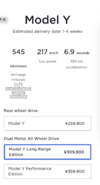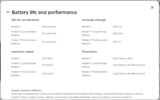If the government was honest and intelligent about wanting to increase the amount of EVs for the general population, then I agree with almost everything already said. The best to do this would of been an instant rebate at the time of sale. This would not only lower the price of the vehicle, it would lower the amount of sales tax paid if applicable, and result in a lower monthly cost since most people finance their vehicles.
Also, many people I know, myself included have changed their W-4 so they don't get hit with a tax bill the next year. Several people claim zero dependents even though they have kids. So a tax credit to reduce taxes owed is of no interest to these people because they break even or get a little back from taxes.
Also, many people I know, myself included have changed their W-4 so they don't get hit with a tax bill the next year. Several people claim zero dependents even though they have kids. So a tax credit to reduce taxes owed is of no interest to these people because they break even or get a little back from taxes.




/cloudfront-us-east-2.images.arcpublishing.com/reuters/VHRCVLVN5ZP4PBY34F6T7AB2AE.jpg)

